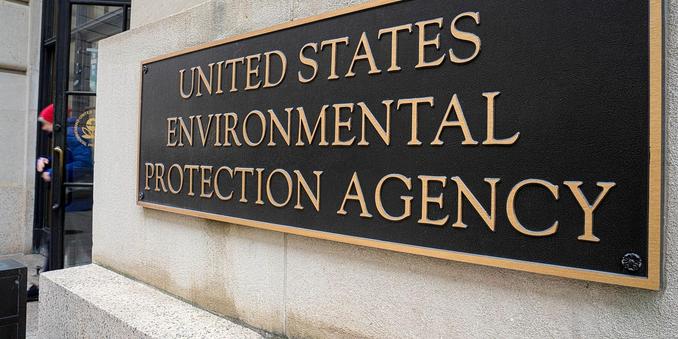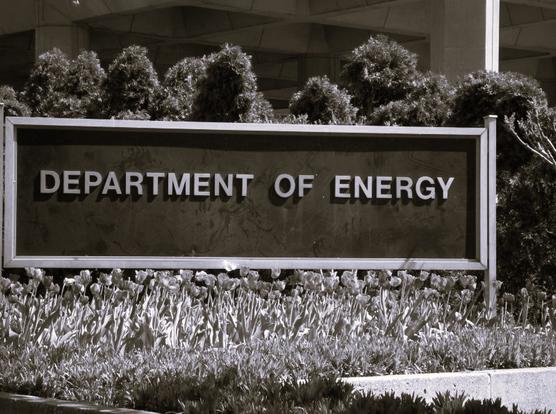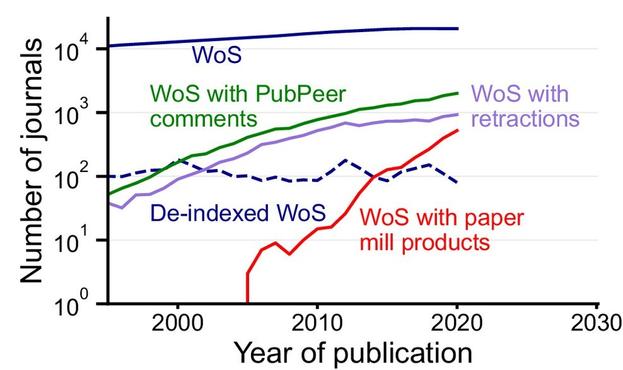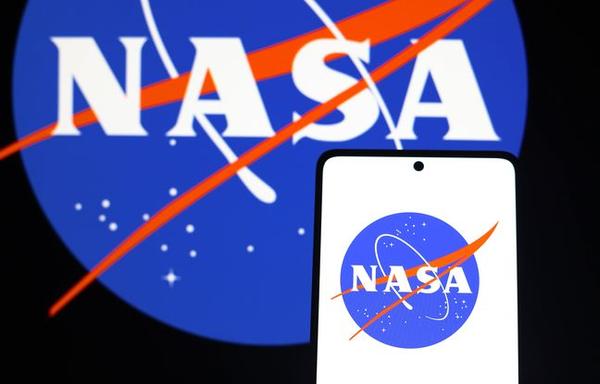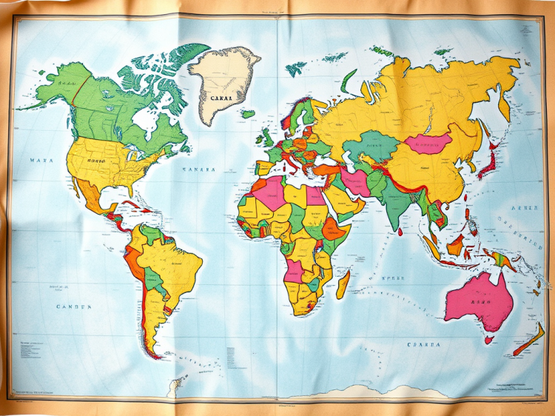The courageous resistance shown by these CDC officials is what we should expect from scientists generally. My greatest respect to them.
#CDC #ScientificIntegrity #Disinformation #Fascism #USPol #RFKJr #Trump

Chaos swirls at U.S. CDC amid messy Trump admin effort to oust director | CBC News
The top U.S. public health agency was left reeling and leaderless as the White House works to expel its handpicked director from the U.S. Centers for Disease Control and Prevention and three senior officials were escorted from its headquarters on Thursday.
The entities enabling scientific fraud at scale are large, resilient, and growing rapidly
https://www.pnas.org/doi/10.1073/pnas.2420092122
"Our results reveal some of the strategies that enable the entities promoting scientific fraud to evade interventions. Our final analysis suggests that this ability to evade interventions is enabling the number of fraudulent publications to grow at a rate far outpacing that of legitimate science."
"Discussions with different stakeholders suggest that many currently perceive systematic fraudulent science as something that occurs only in the periphery of the “real” scientific enterprise, that is, outside OECD countries. Accumulating evidence shows that systematic production of low quality and fraudulent science can occur anywhere (84–89). Moreover, as we show in this study, large North American and European publishers and the editors they appoint provide credibility to these practices. The impact of these practices is likely to be felt much more immediately and strongly in countries with inchoate scientific enterprises but is in no way restricted to them."
The policy’s removal follows Trump’s May 2025 executive order, “Restoring Gold Standard Science,” which directed all federal agencies to roll back scientific integrity policies to the versions in place before January 20, 2021. It replaced the Biden-era reforms with political oversight, requiring each agency to reevaluate and potentially rescind updated safeguards and operate under older scientific integrity policies.
https://scilight.substack.com/p/epa-pulls-down-updated-scientific
"The ability to tell the truth, especially when it does not suit any particularly partisan aims, is an essential prerequisite for a free society. Scientists can leverage their substantial social standing and trustworthiness to preserve this vital ingredient. Under authoritarian conditions in the Soviet Union, many dissident leaders were prominent scientists, circulating underground writings that criticized the pseudoscience that the communist state approved and promoted. These materials helped to break through the wall of invincibility that the government tried to create—even when the dissidents themselves paid a price. Indeed, the US government used to prioritize breaking down autocrats’ control of information throughout countries behind the Iron Curtain, by supporting dissident and alternative news sources that could break barriers to truth.
Every would-be dissident scientist has a different tolerance for risk, and efforts to reestablish public sources of trusted scientific information can’t fully recreate the US science apparatus now being dismantled. But alternative institutions offer a promising pathway for preserving an essential role of science in public life, while maintaining democratic principles that enable a free society. Those in the science community who are willing and able to be more visible can step up. Acting together will be more impactful than going it alone."
https://www.science.org/doi/full/10.1126/science.aea9328?af=R
Facts don’t disappear—they’re erased. The DOE's new report spins CO₂ as heroic, purges leading scientists, and sidelines real climate data.
Dangerous move.
https://brewminate.com/when-facts-collide-with-power-inside-the-does-fictional-climate-report/
"Science is characterized by collaboration and cooperation, but also by uncertainty, competition, and inequality. While there has always been some concern that these pressures may compel some to defect from the scientific research ethos—i.e., fail to make genuine contributions to the production of knowledge or to the training of an expert workforce—the focus has largely been on the actions of lone individuals. Recently, however, reports of coordinated scientific fraud activities have increased. Some suggest that the ease of communication provided by the internet and open-access publishing have created the conditions for the emergence of entities—paper mills (i.e., sellers of mass-produced low quality and fabricated research), brokers (i.e., conduits between producers and publishers of fraudulent research), predatory journals, who do not conduct any quality controls on submissions—that facilitate systematic scientific fraud. Here, we demonstrate through case studies that i) individuals have cooperated to publish papers that were eventually retracted in a number of journals, ii) brokers have enabled publication in targeted journals at scale, and iii), within a field of science, not all subfields are equally targeted for scientific fraud. Our results reveal some of the strategies that enable the entities promoting scientific fraud to evade interventions. Our final analysis suggests that this ability to evade interventions is enabling the number of fraudulent publications to grow at a rate far outpacing that of legitimate science."
A powerful new study (Richardson et al., @PNASNews 2025) reveals the scale of systematic research fraud: fake papers are doubling every 1.5 years - ten times faster than real science. Retractions and deindexing can't keep up. Journals look away. Universities stay silent. Ministries protect their own.
 https://doi.org/10.1073/pnas.2420092122
https://doi.org/10.1073/pnas.2420092122
The authors call for independent, conflict-free structures with real power to act.
#ResearchFraud #ScientificIntegrity #PaperMills #AcademicEthics
https://fr.news.yahoo.com/article-erron%C3%A9-nasa-fausse-bact%C3%A9rie-151736715.html
#Science #Space #CriticalThinking #NASA #ScientificIntegrity
The Imperative of Science Communication in the Modern Era
In today’s rapidly evolving landscape, science communication—often referred to as “SciComm”—is more critical than ever. Recent history underscores the urgency of effectively communicating scientific knowledge, especially in the face of challenges such as aggressive federal funding cuts to science under the Trump administration, persistent attacks on researchers, and a challenging atmosphere for early-career scientists. As researchers encounter heightened scrutiny and diminished support, many have sought opportunities abroad, resulting in a brain drain that threatens America’s status as a global leader in scientific innovation and literacy.
Understanding this broader context emphasizes why science communication isn’t merely beneficial—it’s essential. SciComm acts as a crucial bridge linking laboratory and field research with public policy, education, and everyday decision-making. Without effective communication, groundbreaking discoveries remain inaccessible and misunderstood, policies become misinformed, and society collectively suffers from stagnation in progress.
The Critical Roles of Science Communication
Science communication serves multiple fundamental functions within society:
1. Informing Policy Making
Policy decisions profoundly shape our society, from climate change initiatives to public health policies. Effective SciComm ensures decision-makers have accurate, accessible, and timely scientific information. Conversely, misinformation can lead to poor policy outcomes, such as inadequate responses to climate crises or ineffective health initiatives.
2. Ensuring Public Health and Safety
The COVID-19 pandemic dramatically highlighted the necessity of clear, effective science communication. Public health messages must distill complex epidemiological concepts into actionable guidelines. Miscommunication and misinformation resulted in vaccine hesitancy, skepticism about public health measures, and preventable illnesses and fatalities.
3. Promoting Democratic Engagement
Informed citizens make better decisions. By understanding science, the public can meaningfully participate in democratic processes, hold leaders accountable, and advocate effectively for science-based policies.
4. Fostering Innovation and Economic Growth
Scientific advancements fuel economic growth. Clear communication enables society to recognize the value of investing in research and development, fostering a culture of innovation essential for economic prosperity.
Navigating Contemporary Challenges
The policies under the Trump administration resulted in significant setbacks for science. Budget cuts, censorship of scientific data, and political undermining severely damaged America’s scientific ecosystem. Early-career scientists were particularly vulnerable, caught between their passion for discovery and an uncertain professional future.
Consequently, many relocated to countries more supportive of scientific endeavors. Nations like Canada, Germany, and China actively attracted American-trained talent, recognizing that investing in science and researchers directly translates to economic and intellectual strength.
Sustaining America’s Leadership in Scientific Literacy
Historically, the U.S. has positioned itself as a leader in science, yet this status is fragile without sustained effort, funding, and societal support. Maintaining leadership requires:
- Consistent and adequate funding for scientific research and education.
- Protection and support for early-career researchers.
- Open, transparent communication about the value and outcomes of scientific research.
Improving the Effectiveness of Science Communication
To effectively communicate science, especially in polarized environments, SciComm practitioners must:
Communicating Human Evolution with Sensitivity to Religious Beliefs
Human evolution remains a sensitive topic in many communities where religious beliefs conflict with evolutionary science. Effective SciComm in paleoanthropology demands nuanced approaches:
- Respectful Engagement: Recognize the personal and cultural significance of religious beliefs without disparagement. Dialogue rather than debate creates respectful learning environments.
- Highlight Shared Values: Emphasizing universal human values such as curiosity, discovery, and knowledge bridges ideological divides.
- Identify Common Ground: Evolutionary science and religious beliefs often intersect positively on ethical considerations, community building, and appreciation of life’s complexity.
- Amplify Diverse Voices: Engaging communicators from varied cultural and religious backgrounds offers relatable perspectives, breaking down misconceptions.
Building Social Cohesion Through Science
Science communication doesn’t merely educate; it unites. By promoting literacy and appreciation of the natural world, SciComm fosters social cohesion rooted in evidence-based thinking. Encouraging scientific literacy at every societal level—schools, community programs, and media—enhances collective decision-making, reduces polarization, and promotes harmony.
Educational initiatives should emphasize critical thinking and scientific reasoning, enabling individuals to assess information critically and challenge misinformation. Literacy programs must directly address scientific misinformation, equipping communities with practical tools to identify and counter false claims.
Looking Ahead: Education, Literacy, and Understanding
A robust commitment to education and literacy is the cornerstone of effective science communication. Educational systems must incorporate rigorous, inclusive, and up-to-date science curricula. Prioritizing STEM education from early childhood through adulthood significantly shapes societal perspectives, fostering respect for evidence-based knowledge.
Moreover, understanding the natural world must extend beyond classrooms. Community engagement via citizen science projects, public lectures, interactive museum exhibits, and collaborative research opportunities profoundly enhances societal appreciation and understanding of science.
Conclusion
As contemporary challenges mount—political, social, environmental—effective science communication remains essential for navigating complexities. SciComm empowers informed policy-making, strengthens public health initiatives, invigorates democratic processes, stimulates economic growth, and fosters societal unity. Amid current setbacks and potential declines in scientific leadership, reinforcing our commitment to clear, engaging, and inclusive science communication is not merely advantageous—it’s imperative.
Our collective future depends on an informed, engaged society. By championing education, promoting scientific literacy, and deepening our understanding of the natural world, we build a resilient framework capable of confronting modern challenges. The path forward demands clarity, respect, inclusivity, and active engagement—hallmarks of impactful science communication. With concerted effort and dedication, science will continue to serve as a guiding force for societal advancement, resilience, and unity.
#AmericanScienceCrisis #BrainDrain #CommunicatingScience #DemocraticEngagement #EarlyCareerScientists #EducationAndLiteracy #EvidenceBasedPolicy #HumanEvolution #InclusiveScience #PublicScienceEducation #PublicUnderstandingOfScience #SciComm #ScienceAdvocacy #ScienceAndDemocracy #ScienceAndReligion #ScienceAndSociety #ScienceCommunication #ScienceFunding #ScienceInTheUS #ScienceLiteracy #ScienceOutreach #SciencePolicy #ScienceStorytelling #ScientificInnovation #ScientificIntegrity #ScientificMisinformation #STEMEducation #TrustInScience #WhyScienceMatters
